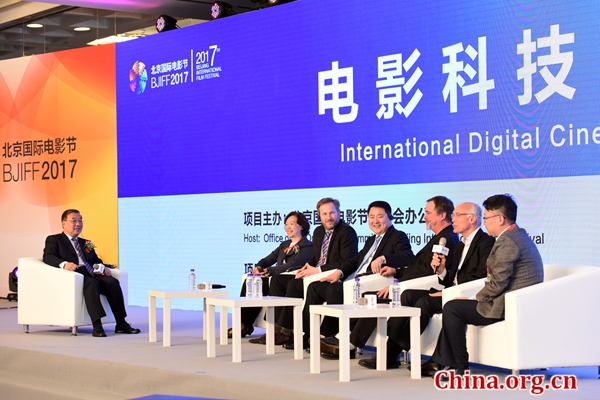China can lead the technology innovation in film
- By Zhang Rui
 0 Comment(s)
0 Comment(s) Print
Print E-mail China.org.cn, April 22, 2017
E-mail China.org.cn, April 22, 2017
|
|
|
Seven domestic and foreign leaders in film technology are invited to deliver keynote speeches and explore the impact of technologies on the film industry’s future, at the International Digital Cinema Technology Forum held during the 7th Beijing International Film Festival in Beijing, April 19, 2017. [Photo/China.org.cn] |
A top film executive appealed to his fellow filmmakers to be responsible and brave in order to compete with world-class film production companies on the big screen during a forum held during the 7th Beijing International Film Festival on Wednesday.
Yu Dong, president of Bona Film Group, said Chinese film companies must dare to seek to overtake the world-class studios.
"Over the past decade, the rapid growth in the number of cinema screens and the technological progress of the domestic market has forced Chinese films to quickly catch up with foreign films in regard to world-class film production processes," Yu said at the International Digital Cinema Technology Forum.
His film company invested in a 3D cinema when most Chinese theaters screens were not prepared to do so in the "Avatar" groundbreaking days in 2010; China's first 3D animal shot was made in the film "The Taking of Tiger Mountain" directed by Tsui Hark and funded by Bona.
Another source of pride for Yu relates to Ang Lee's "Billy Lynn's Long Halftime Walk," invested in and distributed by Bona Film Group in 2016, the world's first 4K 3D feature film at 120fps.
"At the time of the investment, the film aroused wide concern for its super advanced technologies and incapability of display in any cinema in China and even the world," he recalled. Now, there are five screens in the world that satisfy 120fps, including two invested by Bona on the Chinese mainland, one in Taiwan and other two in the United States.
"The two theaters in Beijing and Shanghai that can accommodate the film set box office records per screen, while driving an overall upgrading of the servers in 2K, 3D and 60fps in China and a jump of at least three levels for the 3D effect in China," Yu said.
The film executive continued, "China exceeds North America in the number of screens, becoming the largest market for the screening of films. China now also leads the world in the level of cinemas using world-leading new technologies; however, it requires Chinese filmmakers to have the urge to ensure production quality so that the high-end technical devices will fit and not be wasted. We have worked so hard to build such a big film market in China; we should not just give it away to Hollywood blockbusters."
Zhang Wei, director of the China Research Institute of Film Science & Technology and the China Test Institute of Film, said five major technologies had made a huge impact on the frontier development of the film industry, namely, emerging audio-visual technology, cloud computing and big data, artificial intelligence (AI) and machine learning, virtual reality (VR) and augmented reality (AR), and blockchain.
"I hope that all of you can keep an eye on crossover opportunities, that is, to be able to take full advantage of high-speed Internet, mobile Internet, broadband wireless, mass storage and other technologies, in order to offer innovative film-viewing modes, expand the space for the film market, develop value-added services, and expand film market gains.
"This is a big ocean and is also an area full of opportunities. If we know the various domains well, the opportunities will be greater. Cinemagoers’ demand for rich and colorful cultural art works is generally the driving force of film technology innovation and change, during which personnel like us engaged in film technology must be sensitive, constantly mastering development of cutting-edge technologies through learning and understanding and make them work for us," she said.
The International Digital Cinema Technology Forum was a newly-established themed forum during the 7th Beijing International Film Festival.
Seven domestic and foreign leaders in the film technology field were invited to deliver keynote speeches and explore the impact of technologies on the future of the film industry, including Julian Philip Pinn, chair of the ISO Standards Committee for Cinematography; Michael Armen Karagosian, founder and president of the American film technology consultancy MKPE; David Griffith Stump, technical director of the American Society of Cinematographers; Glenn Kiser, senior director of the Dolby Institute, and Liang Tiehang, deputy director of the Industrial Research Institute of TCL Group, besides Yu and Zhang.
Zhang Pimin, vice president of the China Alliance of Radio, Film and Television, said in a speech before the forum opened that, "Films are a perfect combination of art and technology. Both are indispensable to films like wings to birds. Exquisite artistic quality and fine production add splendor to films. The extensive application of high technologies can boost viewing experience."







Go to Forum >>0 Comment(s)